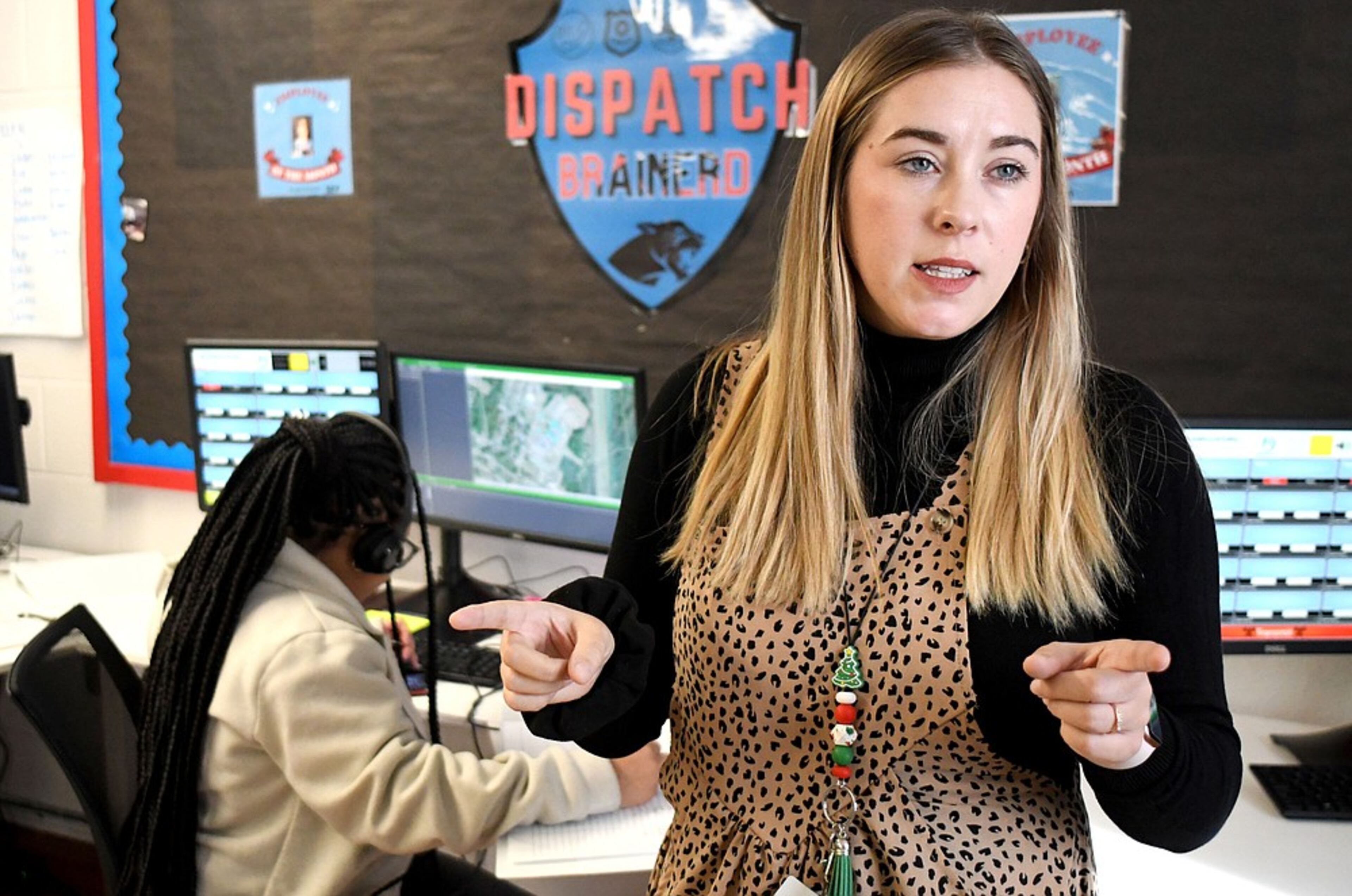New class at Chattanooga high school trains students to become 911 dispatchers

At Chattanooga’s Brainerd High, Hannah Merrell, 17, fake dialed 911 and pretended to be a mother panicking about her 4-year-old being locked in the bathroom.
Across the room, 17-year-old Raquel Butts took the call, building a card to provide information to another student acting as a dispatcher and talking Merrell through potential ways to unlock the door before emergency services arrived.
The Brainerd High seniors were using a 911 simulator as part of a new class that trains students to become 911 dispatchers.
“You never know what you’re gonna get,” Butts said in an interview. “It’s exciting. Sometimes it’s scary. Even though you know you’re doing it with your friends, when you really sit there and you start trying to focus, it just feels real.”

Alisha Chavez, the criminal justice teacher, said one of the main reasons she started the program was to give students access to a credential that allowed them to earn a family-sustaining wage within the community. She thought back to herself as a high school student when she designed the course.
“If something like that had been around for me, it would have changed my life,” she said in an interview. “I wouldn’t have had to struggle for so long to get to where I am, and so I’m trying to reduce their struggle.”
The students are on track to complete their level one public safety telecommunicator certification from the Association of Public-Safety Communications Officials. By the time the students graduate in the spring, they’ll also have CPR and telecommunicator CPR credentials, as well as incident command training.
Those complete two out of the four certifications that Hamilton County 911 requires, Executive Director Jeff Carney said.
“This is very fortuitous for us because every 911 center in the country got hit with the great resignation,” he said in a phone interview. “To have a high school that will put this program out to train seniors to where when they graduate, we could easily bring them on board. It helps us out, it helps the students out, and it helps the community out.”
Dispatch operators gave the program access to their materials and provided recommendations for the certifications and equipment, Carney said.

Next semester, the class will visit Hamilton County 911 at least once a week. The students will be assigned a mentor and get to listen in to calls to learn more about the different programs dispatch uses, Chavez said.
While the students won’t be able to take calls because dispatchers are required to be at least 18 years old, the skills they learn can be implemented when using the school’s simulator system. Students rotate through serving as a caller, call taker, dispatcher and first responder when using the simulator, and the program gives them exposure on how to handle real scenarios, Chavez said.
The first time the class worked through a school shooting scenario, Chavez said she acted as the caller, playing the sound of another girl crying and slowly increasing the volume of the gunshots before she fell silent. Butts, who was on the other end of the line, said the call made her feel really scared because the acting felt real.
“You’re not in that position, but you’re still on the phone, and you hear the gunshots going off,” she said. “You know it’s fake, but at the same time, if you were really in that scenario, people are really dying. Then you’re on the phone with a person who’s expecting you to help them out of the situation, and you can’t sit there. You can’t promise them that they’re going to be OK.”
Working through the scenarios is overwhelming sometimes, she said, but it’s made her more likely to want to work at a dispatch center in the future because being able to save a person’s life would be rewarding. She currently plans on going into real estate.
The seven students in the class were selected based on an application process modeled off of Hamilton County 911′s. Students wrote a paper and submitted letters of recommendation before going through a panel interview.

The class meets every day, and Chavez said some students took summer school classes to have enough space in their schedule.
“They have to really want to be in this program,” she said.
The class is part of the Institute of Law, First Responders and Forensic Science, one of three future ready institutes offered at Brainerd High. Across Hamilton County, there are roughly 30 future ready institutes, which aim to embed small learning communities focused around a variety of industry themes at traditional high schools.
Butts said the program has also taught her how to handle her emotions.
“It’s really different,” she said. “But it’s also really fun because you get to learn things about yourself that you didn’t think that you had.”
Contact Shannon Coan at scoan@timesfreepress.com or 423-757-6396.

MEET OUR PARTNER
Today’s story comes from our partner, Chattanooga Times Free Press, which serves readers in Southeast Tennessee, Northwest Georgia and Northeast Alabama. Visit them at timesfreepress.com or on Twitter @TimesFreePress.
If you have any feedback or questions about our partnerships, you can contact Senior Manager of Partnerships Nicole Williams via email at nicole.williams@ajc.com.
